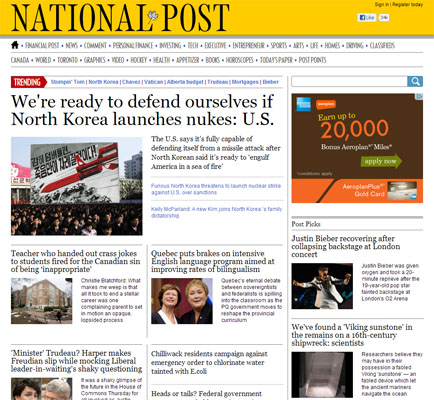- Qualcomm Launches Snapdragon 4 Gen 2 Mobile Platform
- AMD Launches Ryzen PRO 7000 Series Mobile & Desktop Platform
- Intel Launches Sleek Single-Slot Arc Pro A60 Workstation Graphics Card
- NVIDIA Announces Latest Ada Lovelace Additions: GeForce RTX 4060 Ti & RTX 4060
- Maxon Redshift With AMD Radeon GPU Rendering Support Now Available
Canadian Newspaper Begins Charging $150 to Snag a Quote
In their shift to the online space, some newspapers have tried to conjure up some creative money-making schemes to help support their business. Ad banners can sometimes only go so far. The most common solution has been subscriptions – pay so much per week or month, and you have free reign of the content. Sometimes the deal gets sweeter when it involves both paper and online media. For some newspapers though, such as the Canadian National Post, there are other possible solutions.
I’m not sure when the publication put this into action, but upon highlighting and right-clicking text on the National Post’s website, you’ll be prompted with a modest pop-up offering three options to the question, “Obtain a License?”; “Yes”, “No” and “Quit asking me”. Clicking the third option will cease to make the pop-up appear again, although that wouldn’t suddenly make the “need” for its license disappear.

To copy up to 100 words, the Post charges $150, and past that, it’s an additional $0.50 per word. At that price, the publication would undoubtedly be charging more per word than the author itself did.
From a business perspective, this decision seems reasonable. Those who would likely purchase any quotes would be other media – I’d have a hard time believing the Post would be too concerned with someone pasting a quote to Facebook. However, as law professor Michael Geist points out, the Post is going about this the wrong way.
Geist’s biggest argument is that snagging a simple quote is going to fall under fair use – so legally, you shouldn’t have to pay the publication for the quote. In fact, the Supreme Court of Canada has established that in certain circumstances, republishing a much larger portion of the content might still fall under fair use.
Where things get really murky comes with the fact that the Post prompts you to pay when you’re trying to copy a third-party quote. Imagine the newspaper running an article listing the sexiest tech reporters and they (obviously) had a quote from me. I wouldn’t be too pleased if people had to pay for that – especially when the publication is not the owner.
Something tells me that this problem won’t exist for too long though, and perhaps the same could be said about the charge at all. If people are not legally required to request permission to republish modest quotes, then the National Post is essentially charging for air.




